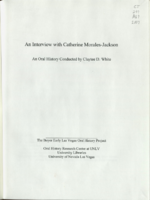Search the Special Collections and Archives Portal
Search Results

Transcript of interview with Mary Cooke by Gigi Arino, March 18, 1978
Date
Archival Collection
Description
On March 18, 1978, Gigi Arino interviewed antique shop owner, Mary B. Cooke (born November 13th, 1936 in Watertown, Wisconsin) in her antique shop in Las Vegas, Nevada. During this interview Mary discusses previous jobs, personal family history, education, and the growth and development of the city. She also expresses her opinions on the topic of welfare, healthcare and the condition of the hospitals in Las Vegas.
Text

Transcript of interview with Owen Earl Cox by Mark Milford, March 6, 1981
Date
Archival Collection
Description
On March 6, 1981, Mark Milford interviewed Owen Earl Cox (born 1909 in Bunkerville, Nevada) about his experiences growing up in and working in Nevada. Cox first talks about his early moves to and from Nevada and his work in road construction in the 1930s. He then discusses his work of machinery at the Basic Magnesium Plant and some of his experiences during that time. Cox also talks about his family, the Mormon Church, the growth of population, and the increase in tourism. He later describes managing a store he owned known as Vegas Village and the types and prices of the products that were sold there. The end of the interview involves a discussion of crime, Cox’s hobby of cattle ranching, and his views on the growth of Las Vegas.
Text

Transcript of interview with Oliver Crickman by William Hawley, March 3, 1979
Date
Archival Collection
Description
On March 3, 1979, William Hawley interviewed Oliver Crickman (born 1933 in Apex, North Carolina) about his experiences from living in Nevada and working in restaurants. Crickman first describes his background and his first occupations prior to starting as a cook in Las Vegas restaurants. He then explains how he gradually moved from the position of cook’s helper to sous chef and his then-current position of executive chef at the Royal Inn. Crickman goes into detail about the operation of those restaurants and other Las Vegas Strip and Downtown Las Vegas properties, and he describes the demographics of cooks as well as how the hospitality industry has changed over time. The latter part of the interview involves a discussion of Crickman’s various residences in Las Vegas over time, the extent of crime, the first places to shop, and a brief discussion on mobile homes.
Text

Transcript of interview with Ruth and Jake Dieleman by James M. Greene, November 15, 1974
Date
Archival Collection
Description
On November 15, 1974, James M. Greene interviewed Ruth Dieleman (born 1908 in Searchlight, Nevada) and her husband Jake Dieleman (born 1904 in Axel, Netherlands) about their lives in Southern Nevada. Ruth first talks about her life in Searchlight while growing up, her experience as an educator, and her various residences in Southern Nevada. Jake first talks about his immigration into the United States and his eventual move to Nevada to get into construction rigging for the building of Hoover Dam. He discusses his work as a rigger in detail but also discusses his work on various Las Vegas casinos as well as his work in the state legislature.
Text

Transcript of interview with Alice Doolittle by Christopher Moran, March 21, 1977
Date
Archival Collection
Description
On March 21, 1977, Christopher Moran interviewed Alice Doolittle (born 1897 in Boston, Massachusetts) about her experiences while living in Nevada. Also present during the interview is Ruth Belding, Alice’s daughter. Doolittle first talks about her reasons for coming to Las Vegas and her eventual occupation as a dental assistant. She also talks about her family’s history of living on the Stewart Ranch and the ranch’s swimming pool that attracted many during the summers of Las Vegas. Doolittle also describes her move to Boulder City with her husband, the first theaters in Las Vegas, and the Union Pacific Railroad. At the end of the interview, the three discuss Helen Stewart, Harley Harmon, and the Doolittle Center, named after Doolittle’s late husband, Ferris Doolittle.
Text

Transcript of interview with Vincent Kethen by Claytee White, December 23, 2009
Date
Archival Collection
Description
In 1964, the year that Vincent Kethen was born, desegregation of Las Vegas schools began. Like many African-American children living in the Las Vegas Westside neighborhood, Vincent was bused out of his neighborhood in third grade to attend a white school. In his case, this meant attending John S. Park Elementary and later other predominantly white schools. He talks about these experiences. John S. Park was a neighborhood of manicured lawns, while the school bus and the classroom were places fraught with fisticuffs. The experience of growing up during that era are recalled. Vincent provides a sense of that it was like to reside in his home neighborhood and the onslaught of the drug culture altered gang-lead neighborhoods. Being bused had positive results he explains, such as athletics, which served as an equalizer. For Vincent, a solid upbringing, which included love of church and the chance to attend college, encouraged him to make good decisions about his future. He received a four-year degree and he returned to Las Vegas to "give back." For over a decade and a half, her has coached young basketball players and helped them see their options for a brighter future than they might otherwise have seen.
Text

Transcript of interview with Myoung-ja Lee Kwon by Claytee White, September 4, 2004
Date
Archival Collection
Description
Myoung-ja Lee Kwon began her life on the grounds of the Kyongbok Palace in Korea. In a country where education is valued, her father's occupation as a university professor meant that the family was highly honored, thus this palatial space allowed them live in a state of prosperity. But war changed these circumstances and in this interview Kwon vividly explains the family's evolution. In 1965, after graduation from Seoul National University she married and a year later, moved to the United State of America where she earned a Master's degree in Library Science in Provo, Utah. Her first professional position was at the University of Nevada Las Vegas as a cataloguer and after many promotions, became interim dean of UNLV Libraries. In 2001, she took the job as Dean of Libraries at California State East Bay Library, retiring in 2008. Currently, she serves as a special lecturer and discussion leader with the Fulbright Senior Specialist Program. During her 2009 visit to Korea, she pr
Text

Transcript of interview with Cathy Morales-Jackson by Claytee White, May 5, 2010
Date
Archival Collection
Description
Catherine (Cathy) Morales-Jackson grew up in the suburban tranquility of Hazlet, New Jersey, with five siblings, a stay-at-home mom and her father, who served the community as mayor and as a school board member. In 1981, "on the day Princess Diana go married," Cathy moved to Las Vegas with her boyfriend/future husband and her mother-in-law. Life in Las Vegas was distinctively different than living in New Jersey she explains. For the next 15 years, they lived at Delta Gardens apartments on Paradise. She started working at UNLV's library as it was moving into a new building. He first position was in the periodicals and microfilm area and in binding. She contrasts both details of the campus and the city then with how it is today. At the time of this interview, Cathy was taking an early retirement at the age of 51. She provides a retrospective of a range of library topics: from the thousands of volumes she bound to the move to Lied Library, from a Celebrity Pancake fundraiser to staff parties, and from the implementation of a campus parking fee to the various library organizations that she has belonged to over the years. Cathy loved her years in the university libraries and feels that the current budget crises is the biggest change she has witnessed. Retirement came at an opportune time for her, but she worries about the future for others.
Text

Transcript of interview with Dennis Ortwein by Claytee White, May 6, 2009
Date
Archival Collection
Description
Dennis Ortwein arrived in Las Vegas in 1956. He shares many details about growing up in Montana, his parents and siblings, his education, and the moment in time when he was offered an opportunity to work in Las Vegas. He also lays out the path his singing career took, starting with school plays, duets with his sister, and high school quartets. Once in Las Vegas, Dennis taught for a while, served as principal, and was involved in creating programs that helped integrate schools. He also talks about his church choir work, entertainment in early Las Vegas, above-ground testing at the Nevada Test Site, and anti-nuclear protests. Dennis served as lab school and student teaching coordinator in Nigeria. He offers several anecdotes and stories about the time he and his family spent there. After retiring early (age 53), Dennis acted as consultant to the Esmeralda County school board, executive director for the National Conference of Christians and Jews, and wrote a book. He is currently enjoying his singing career by appearing at conventions, in musicals, and at weddings and memorials.
Text

Transcript of interview with Brad Nelson by Stefani Evans, October 30, 2017
Date
Archival Collection
Description
In 1984, with the advice of his father ringing in his ears, Brad Nelson uprooted his wife and two children from their Denver home and moved them to Henderson, Nevada, where he would begin a new adventure in shaping the new master-planned community of Green Valley with Mark Fine and American Nevada Corporation (ANC). Nelson, lifelong Nebraskan and only child of his parents, arrived armed with a Bachelor's degree in landscape architecture with urban planning option, a Master's degree in urban planning, and fifteen years of planning and executive experience with the national firm of Harmon, O'Donnell and Henniger Planning Consultants. He arrived in time to plan Green Valley's first village, the Village of Silver Spring. By the time he left ANC for Lake Las Vegas in 1999, his work was done and most large parcels had been sold. As Nelson puts it, by 1999 ANC was "out of land, and I'm a land guy." Lake Las Vegas had plenty of undeveloped land, so "land guy" Nelson a chief operating officer
Text
